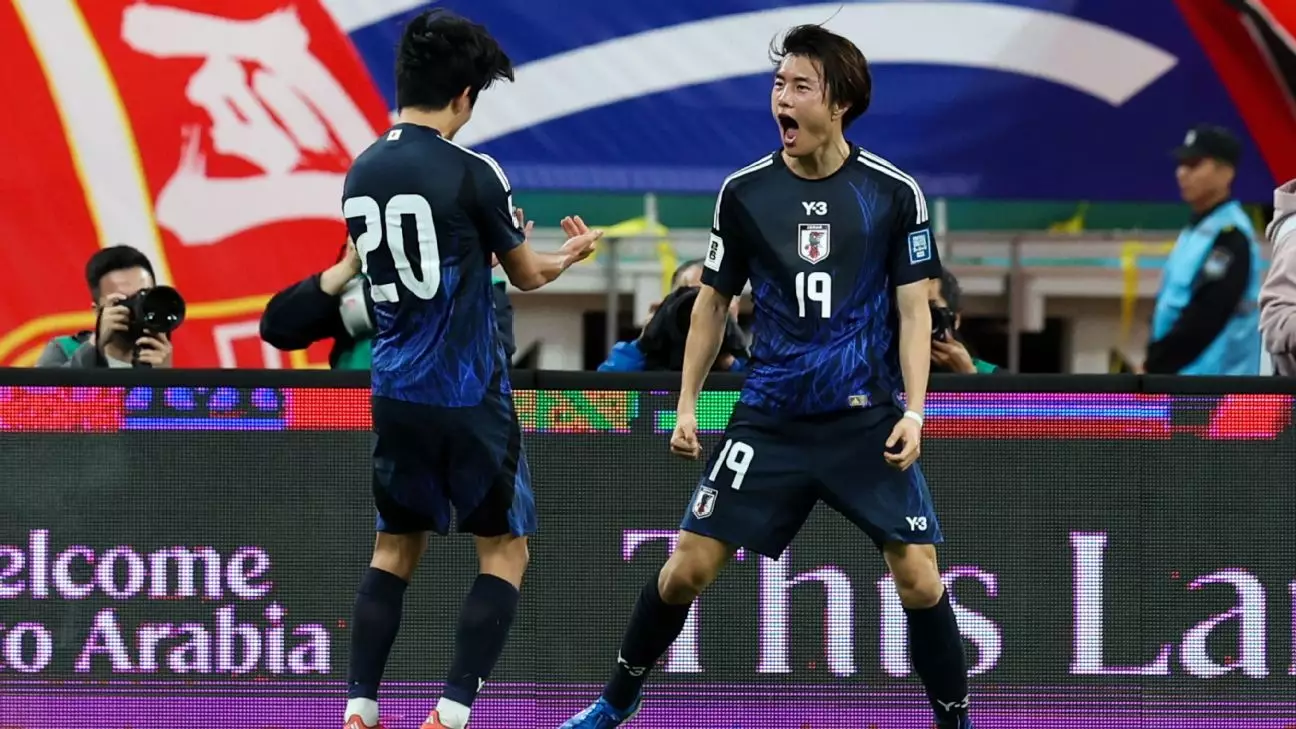As the Asian qualifiers for the 2026 FIFA World Cup approach the final matches, Japan finds itself in a commanding position, poised for what could be its eighth consecutive appearance on the global stage. The Samurai Blue have demonstrated exceptional dominance in Group C, leading by a remarkable nine points ahead of their nearest rivals. With two critical matches on the horizon—one against Bahrain on March 20 and another against Saudi Arabia shortly thereafter—Japan is on the cusp of securing its ticket to football’s most prestigious event. However, this qualification merely sets the scene; the real ambition lies in transforming their potential into tangible success, as indicated by head coach Hajime Moriyasu’s recent declaration that Japan should aim to win the World Cup.
Japan’s aspirations extend far beyond merely participating in the World Cup. The Japan Football Association has laid out an audacious roadmap with “The JFA Pledge for 2050,” which includes a target to win the World Cup by that year. This vision encompasses specific milestones, including a desire to reach the semifinals by 2030. Historically, Japan has struggled to advance past the Round of 16, casting a challenging shadow over these lofty ambitions. Nevertheless, Moriyasu’s declaration challenges a narrative that may have previously seemed unrealistic, daring to envision a Japanese team that can not only compete but emerge victorious on the world stage.
Central to Japan’s burgeoning confidence is the strength and depth of its current roster. Unlike in previous tournaments, where players ventured abroad but remained on the fringes of their club teams, the current squad has a core of players actively contributing in prominent European leagues. Take, for instance, the talent that fills Moriyasu’s strongest lineup: goalkeeper Zion Suzuki at Parma, a sturdy defense comprised of Ko Itakura, Shogo Taniguchi, and Koki Machida, and a midfield boasting Ritsu Dōan, Wataru Endō, and Hidemasa Morita. The attacking trio featuring Takumi Minamino, Takefusa Kubo, and Ayase Ueda showcases a dynamic offensive capability. These names have emerged as vital cogs in their respective clubs, setting the stage for an enthusiastic showing on a global scale.
However, the depth of the squad remains a relative concern. While players like Daizen Maeda and Reo Hatate hail from top-flight clubs like Celtic, their presence on the international scene has yet to make a significant impact. The injury-related absences of potential starters like Hiroki Itō and Takehiro Tomiyasu further amplify the need for a more robust pool of players capable of stepping up reliably.
Coach Hajime Moriyasu has faced scrutiny over his tactical choices, especially after Japan’s stunning victories against heavyweights Germany and Spain at the last World Cup. Critics have noted his initial preference for a counter-attacking style, a strategy he seemed to favor due to a perceived inadequacy of his squad to compete directly with superior teams. However, a shift in approach has emerged, marked by an increasingly attacking philosophy that embraces the squad’s skill sets. Moriyasu has shown a willingness to adopt more offensive formations, integrating players like Mitoma and Dōan in attacking wing-back roles, which has led to a more fluid and aggressive play style.
With this newfound confidence, Japan has favored an attacking mindset that features as many as seven offensive players on the pitch. This evolution is pivotal, especially as they face stronger competition ahead. The balance between defense and attack will ultimately determine Japan’s potential for success in upcoming tournaments, and Moriyasu’s adaptability will be crucial for this balance.
Shifting Mindset: from Humility to Assertiveness
Culturally, Japanese football has long admired values of respect and humility, often demonstrated in how players conduct themselves on and off the field. Yet, to be considered a true competitive force, there exists a need for a shift in mindset—one that incorporates a sense of self-belief and confidence in their abilities. The Samurai Blue’s recent performances in the qualifiers reflect a burgeoning sense of purpose and assertiveness. The victory against China, where they scored seven goals, and a commanding 4-0 win over Indonesia speak volumes about this change in mentality.
Moving forward, Japan must embrace a duality of humility and a killer instinct—one that allows them to respect their opponents while also acknowledging their strengths as potential world-beaters. Building on this psychological framework could be the key to achieving the ambitious goals that lie ahead.
Japan’s path to World Cup glory is imbued with promise and challenges. As they prepare to secure their spot on the world stage, the synergy of their talented roster, a proactive coaching strategy, and a shifting mentality form a robust foundation for future success. While winning the World Cup may still be a stretch too far for this edition, reaching the quarterfinals should be a non-negotiable goal. With this burgeoning confidence, the Samurai Blue seem poised to write a new chapter in their footballing narrative, one that could herald a new era of achievement for Japanese football.

